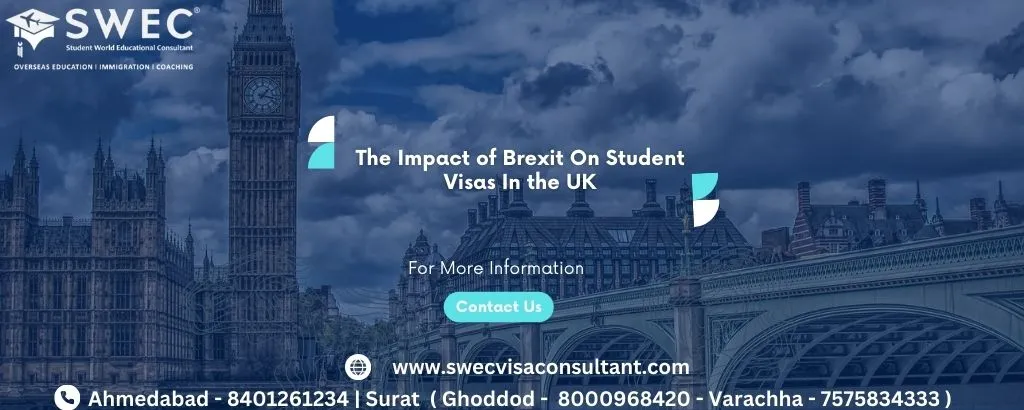The United Kingdom (UK) has long been a coveted destination for international students, including those from India. However, stricter student immigration laws in the past made it challenging for many to pursue their educational dreams in Britain. But with the recent political shift of Brexit, the landscape for Indian students is transforming, potentially opening doors to a brighter future.
Brexit – Background and History
Brexit, short for “British exit,” refers to the United Kingdom’s departure from the European Union (EU), an economic and political union that the UK has been part of since 1973. In 1992, the European Economic Community (EEC) was formally renamed the European Union. The Maastricht Treaty, signed in 1991 and effective from November 1, 1993, established the EU and granted citizenship to all member states’ citizens. This treaty also laid the groundwork for a central banking system and a common currency, the Euro. Although introduced in 1999, member countries had the option to use their national currencies instead.
The call for Brexit gained momentum when the UK Independence Party rose to prominence in 2014. In June 2016, Prime Minister David Cameron held a referendum in which 51.9% of voters chose to leave the EU. The primary concern among voters was that the benefits of free trade did not outweigh the costs associated with the free movement of immigrants. Approximately 17.4 million people voted to leave, while 16.1 million voted to remain.
In March 2017, the official two-year process for the UK’s withdrawal from the EU began under Prime Minister Theresa May’s government. Theresa May was succeeded by Boris Johnson in July 2019, who revised the agreement, notably adding customs barriers between Great Britain (England, Wales, and Scotland) and Northern Ireland.
On January 31, 2020, at 11 PM GMT, the UK officially exited the European Union.
Expert Guidance for Your UK Student Visa Journey
Navigating the complexities of the UK student visa process can be daunting. Our experienced consultants are here to guide you every step of the way, ensuring you meet all requirements and deadlines. Let us help you achieve your academic dreams in the UK easily and confidently.
Details of the Brexit Deal
The Brexit deal between the UK and the EU covers important areas like trade, defense, security, and immigration. Here are the key points:
- Governance and Compliance: The deal includes guidelines for how it will be enforced and penalties for breaking the rules.
- Trade Arrangements: The UK is no longer in the EU’s customs union and single market. However, there is a trade agreement with no tariffs or quotas for goods that meet specific origin rules.
- Immigration: New immigrants to the UK will gradually gain access to benefits and welfare services.
- Currency and Financial Support: The EU promises not to discriminate against the UK regarding the use of its currency and agrees to reimburse the UK for helping support struggling Euro Zone countries.
- Legislative Veto: A “red card” system allows national parliaments to block EU legislation if 55% of them oppose it within eight weeks.
Brexit in the UK: A New Landscape for Indian Students
The United Kingdom’s (UK) decision to leave the European Union (EU), also known as Brexit, has caused a stir across many areas, including education. For Indian students considering higher studies in the UK, Brexit has ushered in a period of change and some uncertainty.
Prior to Brexit, EU students enjoyed certain benefits, like lower tuition fees and easier work opportunities. However, with Brexit, the playing field has levelled. Now, both EU and non-EU students, including those from India, face similar regulations and potentially higher fees.
A significant change is the introduction of a points-based immigration system. This system assesses visa applications based on skills and qualifications, making it potentially more challenging for students with limited academic or professional experience to secure a visa.
Despite these changes, the UK remains a prestigious destination for international students. In the coming sections, we’ll explore the potential benefits and considerations for Indian students navigating this new educational landscape in the UK post-Brexit.
Pre-Brexit Challenges for Indian Students
Prior to Brexit, Indian students faced several hurdles when applying to UK universities:
- Disadvantageous visa regulations: Compared to European Union (EU) students, non-EU students like those from India had to navigate a more complex visa application process. This often involved stricter requirements and higher chances of rejection.
- Limited job opportunities: After graduation, finding work in the UK posed another challenge for Indian students. The pre-Brexit immigration system prioritized skilled workers from the EU, making it tougher for non-EU graduates to secure jobs.
- Competition from EU students: EU students enjoyed a significant advantage in the application process for UK universities. This created an uneven playing field for students from outside the EU, including India.
These factors contributed to a decline in the number of Indian students choosing the UK for higher education. However, Brexit has ushered in a period of potential change.
How Brexit Benefits Indian Students
With the UK charting its course post-Brexit, several positive developments are emerging for Indian students:
- A Level Playing Field: One of the most significant changes is eliminating preferential treatment for EU students. This creates a fairer competition for university admissions, where merit and qualifications become the primary deciding factors. Indian students can now compete on an equal footing with applicants from across the globe.
- Increased Admissions Prospects: The anticipated decrease in EU student enrollment due to Brexit presents an opportunity for universities to focus on attracting talented students from other countries like India. This could lead to a more streamlined application process and potentially higher acceptance rates for Indian applicants.
- Extended Job Search Window: The new post-study work visa allows international students to remain in the UK for up to 24 months after graduation to seek employment. This extended period provides valuable time for Indian graduates to network, gain work experience, and improve their chances of landing a coveted job in the UK.
- A More Open Job Market: Brexit’s focus on a “skill-based” immigration system creates a more open job market for skilled workers, regardless of their nationality. This benefits Indian graduates with in-demand skills who can now compete more effectively with EU job seekers.
- Removal of Work Visa Caps: Previously, the UK imposed a limit on the number of work visas issued to skilled immigrants. This limit has been lifted post-Brexit, potentially easing the process for Indian graduates seeking work authorization after their studies.
A Brighter Future for Indian Students in the UK
- Enhanced Employability: The UK’s revised immigration system prioritizes skilled workers. Indian students graduating with in-demand qualifications will find themselves well-positioned for employment opportunities. The extended job search window allows them to gain valuable work experience and build their resumes, further enhancing their employability.
- Improved Job Market Access: With the removal of preferential treatment for EU workers, Indian graduates will have a fairer shot at securing jobs in their chosen fields. The focus on skills and qualifications creates a more level playing field, allowing them to showcase their potential to employers.
- Streamlined Visa Process: The evolving immigration system might lead to a more streamlined visa application process for Indian students. Reduced bureaucracy and quicker processing times would benefit students seeking to pursue their studies in the UK.
- Culturally Rich Environment: The UK boasts a vibrant and multicultural society. Indian students can expect a welcoming and inclusive environment where they can learn and grow alongside students from diverse backgrounds. This exposure can broaden their perspectives and equip them with valuable intercultural skills.
Negative Impacts of Brexit on India
Brexit has several negative consequences for India, given the country’s close economic ties with the UK. Here are some key impacts:
- Impact on Indian Businesses in the UK: With over 800 Indian companies operating in the UK, Brexit will affect their operations due to fluctuating exchange rates, which could hurt their profitability.
- Loss of Gateway to the EU: The UK served as India’s gateway to the European Union. With the UK out of the EU, India loses the advantage of border-free access to the European market.
- Trade Agreement Challenges: The Broad Trade & Investment Agreement (BTIA) between India and the EU, under negotiation since 2007, will have less impact. India will now need to negotiate a separate agreement with the UK.
- Commodity Prices: Brexit negatively affects commodity prices. The slowdown in China and many European countries has already led to lower global demand, and Brexit exacerbates this issue.
- Currency Exchange Rates: The UK and EU make up 23.7% of the rupee’s effective exchange rate. Brexit could lead to an outflow of foreign portfolio investments, weakening the Indian Rupee further.
- Stock Market Effects: While the broader Indian stock market may not see substantial impacts, companies with significant exposure to the EU, like Tata Steel, Apollo Tyres, Tata Motors, and TCS, experienced drops in stock prices due to Brexit.
Personalized UK Visa Application Support
Our experienced consultants have a deep understanding of UK visa requirements and procedures. We’ll provide clear guidance throughout the entire UK Student Visa Application process, ensuring you meet all eligibility criteria, gather the necessary documentation, and submit a flawless application.
Beyond the Headlines: Additional Considerations for Indian Students
While Brexit presents exciting opportunities, it’s crucial to consider other factors when making an informed decision:
- Evolving Regulations: The UK’s post-Brexit immigration system is still evolving. Staying updated on the latest regulations and visa requirements is essential for Indian students planning to study in the UK.
- Course Selection: Choosing the right course is critical for career success. Indian students should carefully research universities, programs, and job prospects in their chosen fields before applying.
- Financial Planning: Studying abroad involves significant financial commitment. Indian students should factor in tuition fees, living expenses, and the cost of obtaining visas when planning their studies. Scholarship opportunities and part-time work options can help manage these costs.
- Language Skills: Strong English language
Causes of Brexit
In 2015, the Conservative Party called for a referendum on the UK’s membership in the EU. Most Brexit supporters were older, working-class residents from rural England. They were concerned about immigration and refugees, believing that citizens from poorer countries were taking jobs and benefits. As immigration increased, locals worried about job security and the preservation of their way of life, pressuring the government to limit immigration. This sentiment was fueled by unrestricted immigration from Eastern Europe, Syrian refugees, and the potential influx of Turkish citizens if Turkey joined the EU.
Small businesses were frustrated with EU fees, and many believed that leaving the EU would create jobs. There was also a perception that the UK paid more into the EU than it received in return. Those who voted to remain in the EU were mostly from London, Scotland, and Northern Ireland. They supported free trade with the EU and believed that most EU immigrants were young and eager to work. Many thought that leaving the EU would damage the UK’s global standing.
Impact of Brexit on the UK
After the Brexit referendum, the value of the pound fell to a 30-year low, affecting imports and exports. The UK must now negotiate new trade deals, which could be lengthy and complex. Brexit may also lead to the dissolution of the UK, as Scotland voted to remain in the EU. Previously, EU rules required the UK to allow free movement of people, which increased immigration. Brexit enables the UK to control immigration levels, but a decrease in immigration could lead to more job vacancies.
There are concerns that Brexit might reignite ethnic tensions in Ireland. The Republic of Ireland and Northern Ireland have a history of conflict, mitigated by agreements and the EU’s integrated market. Brexit raises fears of a hard border between the two regions. A 2017 Financial Times report indicated that Brexit had already reduced British national income by 0.6% to 1.3%. As an EU member, the UK was a significant contributor to the EU budget, paying for services like the single market and the Common Agricultural Policy.
Impact of Brexit on the EU
Most EU citizens continue to support the union. A Pew Research Center survey found that nearly 75% believe the EU promotes peace, and 55% think it promotes prosperity. However, more than a third feel the UK’s role is diminishing. The EU may lose much of its global influence without Britain, potentially reviving the prominence of individual nation-states. Brexit has inspired right-wing political groups in Italy, Sweden, Belgium, France, Spain, Poland, Germany, and Hungary to demand their countries leave the EU. Trade with the EU dropped sharply after Brexit, with a 45% decrease in exports and a 33% decrease in imports by January 2021. The EU’s population declined by 13% between January 1, 2019, and January 1, 2020, partly due to Brexit.
Global Perspective on Brexit
- Remittances: The pound’s value has decreased since the Brexit referendum, meaning remittances from the UK to other countries are worth less in local currency, hurting families who rely on this income.
- Exports: Export-dependent countries could be affected by Brexit, especially those trading heavily with the UK.
- United States: The US, as the UK’s biggest trading partner, may experience significant economic fallout from Brexit.
- Asian Economies: While the long-term direct impact on Asian economies is expected to be minimal, some businesses in major Asian economies, like India and Japan, could be affected.
- UK Companies: Companies operating in the UK to access EU markets may need to relocate or find new ways to reach EU customers.
- US Dollar: Brexit might strengthen the US dollar as it is seen as a haven during uncertain times, making other currencies like the pound less valuable.
Embarking on Your UK Educational Journey: Resources and Support
Researching Universities and Programs:
- UCAS (Universities and Colleges Admissions Service): https://www.ucas.com/ – This official website is a one-stop shop for researching universities, courses, and applying to undergraduate programs in the UK.
- The British Council India: https://www.britishcouncil.in/ – The British Council offers a wealth of information and resources for Indian students considering UK education, including scholarship opportunities and application guidance.
- QS World University Rankings: https://www.topuniversities.com/university-rankings-articles/world-university-rankings/top-universities-uk – Gain insights into the top universities in the UK based on various criteria, aiding you in selecting a program that aligns with your academic goals.
Financing Your Studies:
- Chevening Scholarships: https://www.chevening.org/scholarship/india/ – The UK government offers prestigious Chevening scholarships to outstanding Indian students pursuing postgraduate studies.
- Commonwealth Scholarship Commission in India: https://www.britishcouncil.in/study-uk/scholarships/commonwealth-scholarships – Explore scholarship opportunities provided by the Commonwealth Scholarship Commission to support Indian students’ postgraduate studies in the UK.
- Indian Government Scholarship Schemes: – Research scholarship programs offered by the Indian government, such as the Pradhan Mantri Jan Dhan Yojana (PMJDY) scholarship scheme, which might provide financial aid for studying abroad.
Visa Application Process:
- UK Visas and Immigration (GOV.UK): https://www.gov.uk/browse/visas-immigration – This official website provides comprehensive guidance on the UK visa application process for international students, including visa types, required documents, and fees.
- Immigration Advisors: – Consider consulting registered immigration advisors specializing in UK student visas. They can offer personalized advice and assist you with the application process for a smooth experience.
Life in the UK:
- The Student Room: https://www.thestudentroom.co.uk/ – Connect with other Indian students studying in the UK through online forums and communities like The Student Room. Gain valuable insights into student life, accommodation options, and cultural experiences.
- Indian Student Associations in the UK: – Many universities have Indian student associations that provide support and social connections for Indian students studying in the UK. Utilize these resources to build a network and feel at home in a new environment.
Stress-Free Visa Process with Proven Experts
Applying for a UK student visa can be stressful, but it doesn’t have to be. With our team’s expertise and dedicated support, you can navigate the process with ease and confidence. Let us handle the complexities while you focus on your studies and future. Get in touch now to start your stress-free visa journey.
Conclusion
Brexit has undeniably reshaped the educational landscape for Indian students in the UK. With a more balanced playing field, increased job opportunities, and a potential for a streamlined visa process, the UK presents an attractive option for pursuing higher education. However, thorough research, sound financial planning, and utilizing available resources are crucial for ensuring a successful and enriching educational journey in the UK. Embrace the exciting possibilities that Brexit presents, and embark on your academic adventure with confidence and preparation.
Frequently Asked Questions on Brexit’s Impact on Indian Students
Q1. How has Brexit impacted Indian students planning to study in the UK?
Ans 1. Brexit has changed the landscape for Indian students, including potential changes in tuition fees, visa regulations, and opportunities for scholarships. While the UK’s separation from the EU might not directly affect non-EU international students, it has led to stricter immigration controls and possible changes in work opportunities post-graduation.
Q2. Will tuition fees increase for Indian students after Brexit?
Ans 2. Tuition fees for Indian students are unlikely to be directly impacted by Brexit since they are classified as international students, similar to their status before Brexit. However, changes in the UK economy and university funding might lead to fee adjustments over time.
Q3. Are there any changes in visa regulations for Indian students due to Brexit?
Ans 3. Brexit has led to new immigration rules, but the UK government has introduced the Graduate Route visa, allowing international students to stay and work in the UK for two years after graduation. This is a positive change for Indian students seeking work experience in the UK post-study.
Q4. How does Brexit affect the availability of scholarships for Indian students?
Ans 4. Brexit may indirectly impact scholarships due to potential changes in funding and economic conditions. However, many UK universities continue to offer scholarships specifically for international students, including those from India.
Q5. What is the Graduate Route visa, and how does it benefit Indian students?
Ans 5. The Graduate Route visa allows international students to stay in the UK for two years after completing their degree to work or look for work. This new visa route provides Indian students with valuable opportunities to gain work experience and improve their career prospects.
Q6. Will Brexit affect the job market for Indian students in the UK?
Ans 6. Brexit might impact the job market due to economic uncertainties and changes in immigration policies. However, the UK’s commitment to attracting international talent through initiatives like the Graduate Route visa suggests ongoing opportunities for Indian students in various sectors.
Q7. Are there changes in healthcare access for Indian students in the UK post-Brexit?
Ans 7. Indian students are required to pay the Immigration Health Surcharge (IHS) as part of their visa application, which grants them access to the National Health Service (NHS). Brexit has not changed this requirement for non-EU international students.
Q8. How has Brexit affected the cultural experience for Indian students in the UK?
Ans 8. While Brexit has led to some political and social changes, the UK remains a diverse and multicultural country. Indian students will continue to find a rich cultural experience and vibrant international communities at UK universities.
Q9. Is there any impact on internships and work placements for Indian students due to Brexit?
Ans 9. Brexit might cause changes in the availability of internships and work placements, particularly with companies that have strong ties to the EU. However, the UK government is keen on retaining international talent, which could mean new opportunities and partnerships for Indian students.
Q10. What should Indian students consider when planning to study in the UK post-Brexit?
Ans 10. Indian students should stay informed about visa regulations, potential changes in tuition fees, and available scholarships. They should also consider the new Graduate Route visa and its benefits for post-study work opportunities. Keeping up with university-specific updates and government policies will help them make informed decisions.






